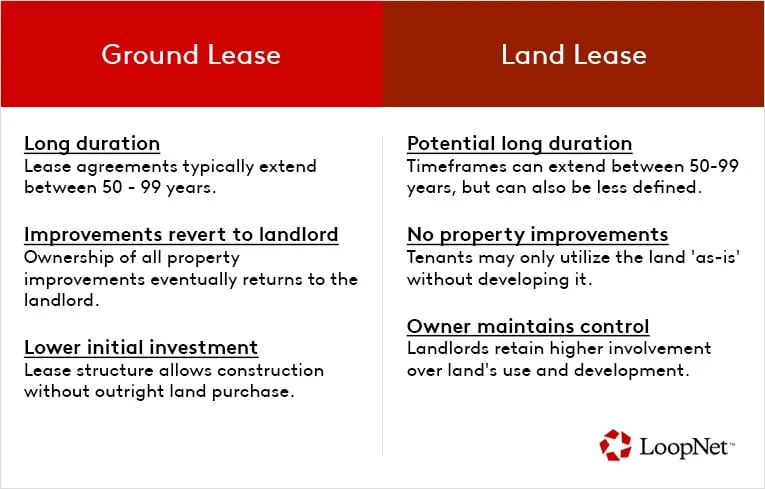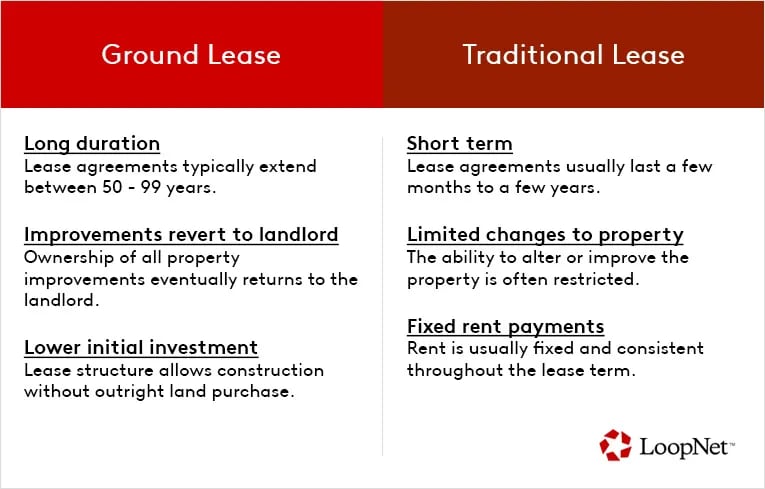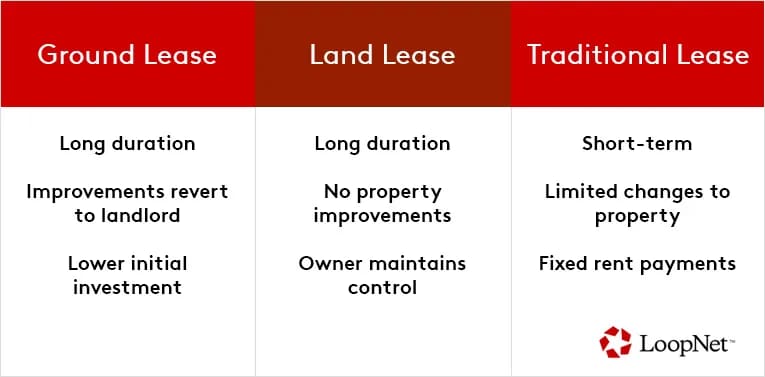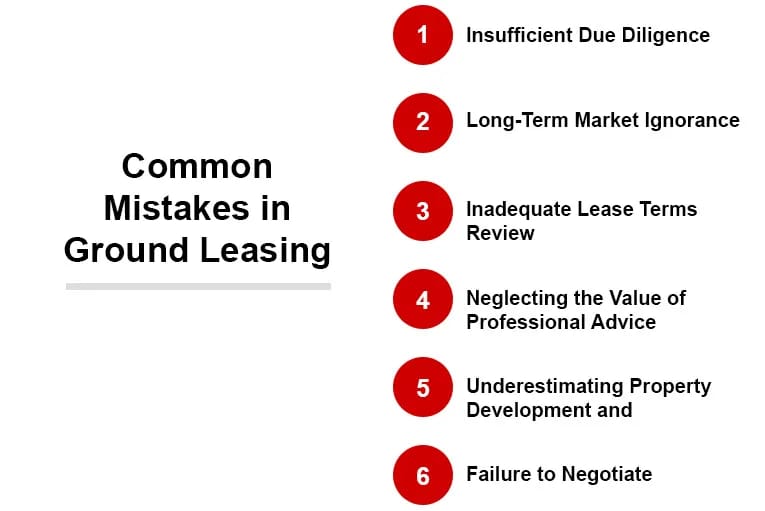What is a Ground Lease? A Breakdown for Commercial Real Estate

Unlocking the world of commercial real estate investing begins with a clear understanding of its varied financing strategies. A crucial piece of that puzzle is the ground lease. Deceptively simple, a ground lease serves as a powerful tool in leveraging real estate holdings and streamlining business growth. This article goes into the intricacies of ground and land leases, from their fundamental workings to financing considerations, expiration nuances, and the ownership stakes in leased-land properties.
What is a Ground Lease?
A ground lease is a long-term arrangement where a tenant has the right to develop a parcel of land and then relinquish the improvements to the property owner upon lease expiry. Typically extending 50 to 99 years, ground leases enable development without the tenant having to purchase the land.
Key Takeaways
- Long-Term Arrangements & Development Rights: Ground leases are long-term deals (typically 50-99 years) that provide tenants the right to develop and improve a parcel of land without owning it.
- Tenant's Responsibilities & Benefits: In a ground lease, tenants handle significant liabilities such as rent, taxes, construction, and property management. However, they also gain the advantage of accessing prime locations without hefty initial investment.
- Reversion of Improvements: Although tenants make improvements, ownership of these enhancements reverts to the landlord at the lease's end, unless an extension or renewal is agreed upon.
- Finance and Lease Assignment Complications: Financing buildings on leased land can get complex, particularly if the lease is subordinated. Lease assignment, which allows lease obligations transfer, is another intricate but essential aspect often overlooked in ground leases.
Ground Leases vs Land Leases
Ground leases and land leases are commonly leveraged in commercial real estate to maximize land utilization and financial gain from property without selling it outright. These lease types provide a framework for property development, serving as a bridge between landowners and developers.
Differences Between Ground Leases and Land Leases
Ground leases and land leases, while often used synonymously in commercial real estate, can signify distinct arrangements given lease specifics and local terminologies. Both involve a tenant leasing from a landlord for an extended period (often 50-99 years), exploring the land for usage and building, without purchasing the property.

However, under a ground lease, the tenant can develop the land during the lease. At the end, improvements (such as buildings, infrastructure) shift ownership back to the landlord. Here, ground leases tend to put taxes, insurance, maintenance, and other costs on the tenant.
Conversely, land leases can refer to less defined terms or shorter timeframes, allowing tenants to use the land 'as-is' and may not necessitate property revert at the lease end.
These interpretations can differ, so it's vital to thoroughly review and understand lease terms. Consultation with a real estate professional or legal counsel is encouraged.
Ground Lease vs. Traditional Lease
The nature and terms of ground leases distinguish them significantly from traditional leases.

In a traditional lease, a tenant rents the property for a much shorter period, usually ranging from a few months to a few years. The tenant doesn't usually make major permanent changes to the property during this period, and the lease agreement typically outlines each party's responsibilities, such as maintenance, insurance, and property taxes. Often, these responsibilities are handled by the landlord unless the lease states otherwise.
In contrast, a ground lease encompasses much more extended periods, generally spanning 50-99 years. During this timeframe, the tenant has the right to construct buildings or make significant improvements to the property, which means the tenant assumes numerous responsibilities traditionally managed by property owners.
While there are plenty of benefits, like being able to develop prime locations, potential tenants must weigh them against the increased responsibilities, long-term commitment, and the eventual surrender of the improvements to the landlord. The decision to enter a ground lease should follow a critical evaluation of these factors.
The key differences between the two are the length of the lease, potential for property improvement, and the distribution of financial and managerial responsibilities, which make each of these lease types suitable for different real estate strategies.

How Does a Ground Lease Work?
In a ground lease, tenants assume responsibility for rent, taxes, construction, and all aspects of property management. This lease invites a significant degree of planning, as tenants must negotiate terms aligning with business goals, considering the eventual turnover of improvements to the landlord.
Ground Leases in Practice: A Real-World Example
A practical example can illustrate how ground leases work. Let's consider a famous global pizza chain - Pizza Hut.
Pizza Hut, recognized for its iconic red roofs, frequently operates under ground leases for many of its store locations. Here's how it works: Pizza Hut enters into a long-term ground lease agreement as a tenant. They strategically choose high-traffic locations to serve their customers effectively.
Under this ground lease agreement, Pizza Hut has the right to construct its restaurant on the leased land. Despite not owning the land, Pizza Hut takes on major responsibilities such as paying property taxes, dealing with insurance, and maintaining the building itself throughout the lease term. This strategy allows the company to expand its locations at a lower initial cost compared to outright property purchases.
At the end of the lease, unless a renewal or extension process is agreed upon, the improvements, including the Pizza Hut restaurant, become the landlord's property.
This real-world example shows how a ground lease can be beneficial to both tenant (Pizza Hut) and the landlord. However, it's essential to remember that the specifics of each ground lease agreement can vary significantly. Always thoroughly review all lease terms and consult with a real estate professional when considering a ground lease.
Pros and Cons of Ground Leases
Pros of a Ground Lease for Tenants
- Access to prime locations
- Lower initial investment
- Increased flexibility
Cons of a Ground Lease for Tenants
- Long term commitment
- Loss of improvements
- Restricted property control
Pros of a Ground Lease for Landlords
- Retaining ownership
- Steady income
- No management hassle
Cons of a Ground Lease for Landlords
- Risk of tenant default
- Missed opportunities if the property value spikes
- Dependence on tenant success
Common Mistakes in Ground Leasing
Like all ventures, ground leasing has its pitfalls. Here are some common mistakes tenants and landlords alike should avoid in ground leasing:

Insufficient Due Diligence
Before entering a ground lease, sufficient research is vital. From verifying the landlord's ownership of the land to evaluating accessibility and zoning restrictions, due diligence can prevent future hiccups. Always consult with legal experts and conduct comprehensive research before signing a ground lease.
Long-Term Market Ignorance
Ground leases last several decades, and market conditions will almost certainly change during this time. Failure to account for long-term market predictions may lead to poor investment decisions. It's crucial to have a thorough understanding of the market dynamics and future predictions applicable to the leased land's location.
Inadequate Lease Terms Review
Every single term or provision in a ground lease agreement can have significant impacts. Small clauses regarding the lease's duration, extension, rent increases, responsibilities upon lease expiration, and handed-over improvements can all endanger the tenant's assets if not carefully reviewed and understood. Always ensure every provision in the agreement is clarified and understood before signing.
Neglecting the Value of Professional Advice
Ground leases are complex. Engaging professionals such as real estate lawyers, brokers, and experienced investors can provide invaluable insights and help detect hidden traps in lease agreements.
Underestimating Property Development and Management Costs
Tenants usually bear the responsibility of developing the property and maintaining it throughout the lease term. Underestimating these costs can severely affect the financial viability of the agreement.
Failure to Negotiate
Landlords often propose the initial lease agreement, but this is usually a starting point and open to negotiation. Tenants who fail to negotiate may find themselves disadvantaged by unfavorable terms. Always consult with real estate professionals when entering a ground lease and stay informed about industry trends and changes. Knowledge and careful planning are your best allies against common pitfalls in ground leasing.
Lease Assignment in Ground Leases
A critical, often overlooked, facet of ground leasing is lease assignment, allowing tenants to transfer lease obligations to another party. Given the high stakes and long-term nature of ground leases, this process can be complex.
At its core, lease assignment establishes a direct relationship between the landlord and the new tenant. The initial tenant may retain some responsibilities if the new tenant defaults on the lease. For tenants seeking greater flexibility, assigning the lease can enable an exit strategy during financial upheavals or new opportunities. However, landlord's consent is usually necessary, contingent upon the new tenant's financial credibility.
Take for example commercial entities like franchises. They often engage in lease assignments, acquiring land for outlets and assigning the ground lease to another entity to build and operate the store.
However, lease assignment involves legal and financial considerations. Tenants should seek advice before proceeding. For landlords, oversight in the assignment process helps ensure property use aligns with their long-term expectations and plans.
What Happens When a Ground Lease or Land Lease Expires?
Upon expiration, the tenant's leasehold improvements-such as buildings or infrastructure-revert to the landlord unless a renewal or extension of the lease is negotiated. Investors must acknowledge this eventuality and plan developments accordingly.
Ground Lease Financing - How to Finance a Building on Leased Land
When considering a ground lease, savvy investors evaluate a range of vital financial elements. They must especially understand cap rate. This critical indicator helps them discern potential returns on their commercial real estate investments.
Understanding financing options, specifically commercial real estate loans, is a vital aspect of engaging in a ground lease transaction. Ground lease financing, a nuanced component of these loan categories, allows development on leased land. The arrangements can be either subordinated or unsubordinated ground leases. In a subordinated ground lease, landlords agree to be secondary if the tenant's lender needs to step in due to a default, which can lead to higher rents for them.
On the other hand, an unsubordinated lease offers more protection to the landlord but may result in lower rental returns. Awareness of how commercial real estate loans function within ground lease financing can be the deciding factor in realizing the full potential of your investment.
Ownership of a Building on Leased Land
Developing on leased land involves detailed agreements outlining ownership rights. Upon lease expiry, customary provisions stipulate the property-including buildings-reverts to the landlord. Tenants and landlords must fully understand and agree to these terms.
Insights for Real Estate Investors and Developers
Discerning the intricacies of ground leases is key to astute commercial real estate strategies. With careful evaluation and market foresight, investors can leverage ground leases for minimized capital outlays and potential asset increases, while landlords enjoy steady revenue and future property improvements.
To stay current with market trends and make informed investment decisions, consider various property types involved in ground leases, like prime retail locations, office buildings, hotels, industrial properties, and warehouses. Ready to explore these prospects? Browse the various listings available on our website and turn knowledge into investment success.
Commercial Real Estate For Sale
This article was updated on 12/12/2024
